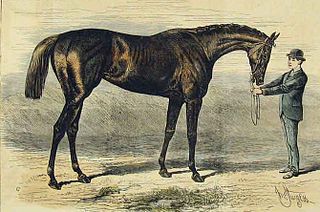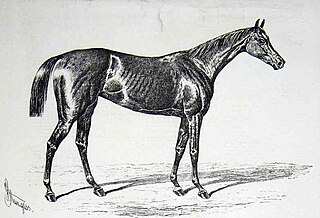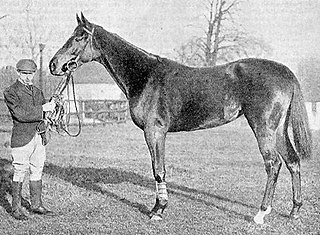
Ormonde was an undefeated English Thoroughbred racehorse who won the 1886 English Triple Crown and was labelled the 'horse of the century' at the time. He also won the St. James's Palace Stakes, Champion Stakes and the Hardwicke Stakes twice. Ormonde was trained at Kingsclere by John Porter for the 1st Duke of Westminster. His regular jockeys were Fred Archer and Tom Cannon. After retiring from racing he suffered fertility problems, but still sired Orme, who won the Eclipse Stakes twice.

Bend Or (1877–1903) was a British Thoroughbred racehorse who won the 1880 Epsom Derby. His regular jockey Fred Archer, winner of thirteen consecutive British jockey titles, said Bend Or was probably the greatest horse he had ever ridden.

Ard Patrick (1899–1923) was an Irish-bred, British-trained Thoroughbred racehorse and sire. One of the leading two-year-olds of 1901, he improved in 1902 to win The Derby, defeating the filly Sceptre. He returned from Injury problems to record his most important success when he defeated Sceptre and the Derby winner Rock Sand in the 1903 Eclipse Stakes at Sandown Park Racecourse. He was then retired from racing and exported to Germany where he became a successful sire of winners.

Dutch Oven (1879–1894) was a British Thoroughbred mare that won the 1882 St. Leger Stakes. Raced extensively as a two-year-old, she won nine races and £9429, but her form faltered in her late three and four-year-old seasons. Retired in 1884, Dutch Oven was not considered to be a success in the stud, but her offspring exported to Australia and Argentina did produce successful racehorses.

Shotover (1879–1898) was a British Thoroughbred racehorse and broodmare. In a career that lasted from 1882 to 1884, she ran 15 times and won five races. As a three-year-old, racing against colts, she became the first filly to win the first two legs of the English Triple Crown: the 2000 Guineas at Newmarket and the Derby at Epsom. She went on to win twice at Royal Ascot, but failed in her bid for the Triple Crown when she finished third in the St Leger at Doncaster. She was retired in 1884 and became a successful and influential broodmare. Shotover died in 1898.

St. Blaise (1880–1909) was a British Thoroughbred racehorse and sire. In a career that lasted from 1882 to 1884 he ran twelve time and won seven races, although three of these wins were walk-overs. His most important success came in 1883 when he won The Derby. At the end of the season he was sold and exported to the United States to stand as a stallion where he had some success. St. Blaise was killed in a fire in 1909.

Gustavus (1818–1840) was a Thoroughbred racehorse that won the 1821 Epsom Derby. Gustavus was the first grey horse to win the Epsom Derby. He raced until he was four years old and was retired to stud in 1823. Gustavus was exported to Prussia in 1836, at the age of 18. Gustavus was not a successful sire.

Whisker was a Thoroughbred racehorse that won the 1815 Epsom Derby and was a full-brother of the 1810 winner Whalebone. Whisker raced until he was a six-year-old, but did not race in 1817. Whisker was retired to stud in 1819, where he became a successful and influential sire. The offspring of Whisker and Whalebone continued the sire-line of Eclipse into the 20th century.

Tristan (1878–1897) was a British Thoroughbred racehorse and sire. In a career that lasted from the April 1880 to October 1884, he ran 51 times and won 27 races. A useful performer at two and three years old, he matured into an outstanding horse in his last three seasons, winning important races at distances ranging from six furlongs to two and a half miles and defeating three winners of The Derby. Unusually for a 19th-century racehorse, he was regularly campaigned internationally, winning three consecutive runnings of the Grand Prix de Deauville. Tristan's success was achieved despite a dangerous and unpredictable temperament: at the height of his success, he was described as "a very vile-tempered animal".

Orme was a British Thoroughbred racehorse. He was trained at Kingsclere by John Porter for the 1st Duke of Westminster. As a two-year-old he won the Middle Park and Dewhurst Stakes. As a three-year-old he was not well enough to take part in the 2000 Guineas and Epsom Derby, but came back to win the Eclipse Stakes. Orme stayed in training as a four-year-old and won another Eclipse Stakes, becoming the first horse to win the race twice, a feat that has only been repeated four times since. After he had retired from racing, he became a successful sire and was Champion sire of Great Britain in 1899. His son Flying Fox won the Triple Crown and the Eclipse Stakes. Orme also sired Epsom Derby winner Orby and 1000 Guineas winner Witch Elm. His regular jockeys were George Barrett and Morny Cannon.

Petrarch was a British Thoroughbred racehorse and sire who won two British Classic Races in 1876. In a career that lasted from October 1875 to October 1878 he ran sixteen times and won eight races. In 1875, Petrarch won the Middle Park Stakes on his only appearance of the season. As a three-year-old in 1876 he won two of the three races which comprise the Triple Crown, taking the 2000 Guineas at Newmarket and the St Leger at Doncaster. He finished unplaced when favourite for The Derby. As a four-year-old he won three races including the two and a half mile Ascot Gold Cup which at that time was regarded as the most important weight-for-age race in the world. Petrarch was regarded by contemporary experts as a brilliant, but inconsistent performer. After winning once as a five-year-old in 1878 he was retired to stud where he became a successful sire of winners.

Busybody (1881–1899), was a British Thoroughbred racehorse and broodmare who won two British Classic Races in 1884. In a racing career which lasted from September 1883 until May 1884 she ran six times and won five races. As a two-year-old in 1883 she won her first three races including the Middle Park Plate and the Great Challenge Stakes before sustaining her only defeat when conceding weight to the winner Queen Adelaide in the Dewhurst Stakes. As a three-year-old she won the 1000 Guineas over one mile at Newmarket and The Oaks over one and a half miles at Epsom Downs Racecourse a month later. She was then retired to stud where she became a successful broodmare.
Music was a British Thoroughbred racehorse and broodmare who won the classic Oaks Stakes at Epsom Downs Racecourse in 1813. Music's success in the Guineas was the only win in a seven race career and gave her owner George FitzRoy, 4th Duke of Grafton the first of twenty classic wins. Music was sold and exported to Ireland at the end of her three-year-old season.
Briseis (1804–1824) was a British Thoroughbred racehorse and broodmare who won the classic Oaks Stakes at Epsom Downs Racecourse in 1807. Her win in the Oaks was her third win from as many starts, but she was beaten in her remaining three races before being retired from racing in 1808. At stud she proved to be a successful broodmare, producing several good winners including the dual classic winner Corinne. The mare's name was often spelled Briseïs.

Pilgrimage (1875–1897) was a British Thoroughbred racehorse. As a two-year-old she was only defeated once and won the Dewhurst Plate. She only raced three times as a three-year-old, winning the 2000 Guineas and 1000 Guineas, before finishing as the runner-up in the Oaks Stakes. After retiring from racing she became a successful broodmare, foaling Oaks winner Canterbury Pilgrim and Derby winner Jeddah.
Scottish Union (1935–1954) was a British Thoroughbred racehorse and stallion best known for winning the classic St Leger Stakes in 1938. He was one of the highest-rated British two-year-olds in 1937, when his wins included the Middle Park Stakes at Newmarket Racecourse. In the following year he ran prominently in all three legs of the Triple Crown, finishing second in the 2000 Guineas and The Derby before his win in the Leger. As a four-year-old he won the Coronation Cup but appeared beaten for stamina in the Ascot Gold Cup before being retired to stud where his record was moderate. He died at the age of nineteen in 1954.
Lambert Simnel (1938–1952) was a British Thoroughbred racehorse and sire, who raced during World War II and was best known for winning the classic 2000 Guineas in 1941. As a two-year-old he won once and finished second in the Dewhurst Stakes. In the following spring he won the 2000 Guineas, beating a field which included the subsequent Classic winners Owen Tudor and Sun Castle. He was beaten when favourite for the Derby and finished unplaced in the St Leger. He won once as a four-year-old in 1942 before being retired to stud. He stood as a breeding stallion in England and Argentina with limited success before his death in 1952.

Airs and Graces was a British Thoroughbred racehorse and broodmare. As a two-year-old she raced in the colours of the 6th Duke of Portland and showed modest ability, winning one minor race. After being bought by the Australian sportsman W T Jones she showed much improved form at three in 1898, winning the Epsom Oaks and being placed in both the 1000 Guineas and the Coronation Stakes. She failed to win a race in 1900 but ran well to finish second in the Cambridgeshire Handicap. She was exported to France to become a broodmare and produced two top-class winners.
Enterprise was a British Thoroughbred racehorse and sire. As a two-year-old in 1886 he was one of the best horses of his generation in England, winning the New Stakes and the July Stakes as well as finishing second in the Middle Park Plate and the Dewhurst Plate. In the following spring he recorded his biggest victory when winning the 2000 Guineas as the 2/1 favourite. He was one of the leading fancies for the Epsom Derby but missed the race after sustaining an injury in training. He remained in training until the end of 1888 but failed to recover his best form. He made no impact as a breeding stallion.

Galliard was a British Thoroughbred racehorse and sire. He showed top-class form as a two-year-old in 1882 when he won the Chesterfield Stakes at Newmarket and the Prince of Wales's Stakes at York. In the following year he won the 2000 Guineas and then ran third when favourite for the Epsom Derby. His performances in these two races led to some questions regarding the integrity of his regular jockey Fred Archer. At Ascot Racecourse he recorded a hat-trick of wins when he took the Prince of Wales's Stakes, St James's Palace Stakes and Triennial Stakes. He was strongly fancied for the St Leger but his racing career was ended by injury. He had some influence as a breeding stallion through his son War Dance and his daughter Black Duchess.














